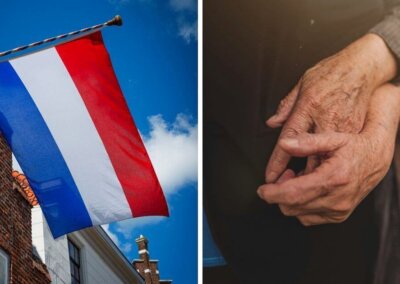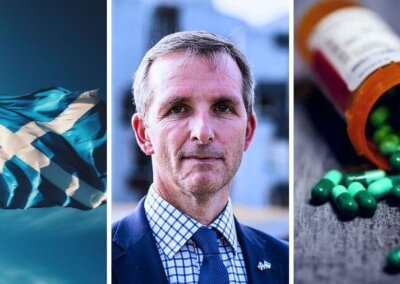Assisted suicide advocates in three different countries that have already legalised euthanasia have this week sought to expand the regime.
Children under the age of twelve, dementia patients and those who have a “fulfilled life” are all targeted by those who wish to expand the so-called ‘right to die’.
The Netherlands
The Netherlands was the first country in the world to legalise euthanasia when its Termination of Life on Request and Assisted Suicide (Review Procedures) Act came into effect in 2002.
Under the country’s current law, euthanasia for children aged between 1 and 12 years old is prohibited. However, non-voluntary euthanasia is available for Dutch babies up to 12 months. Children between 12 and 16 can be euthanised with the approval of their parents.
A coalition of three Dutch teaching hospitals has undertaken a survey of 38 doctors which they claim shows 84% of paediatricians in the country want euthanasia for children between 1 and 12 years old. A report on the survey was recently tabled in the lower house of the Dutch parliament by the country’s Minister for Health, Welfare and Sports.
Recently, The Telegraph and the Daily Mail reported that a Dutch family held down their mother, as she fought against being euthanized by her doctor.
The vulnerable patient, who suffered from dementia, had allegedly expressed a wish to be euthanised but also indicated that she wanted to determine the right time.
In the days leading up to the killing, the patient stated her desire to live, saying “I don’t want to die” several times. Despite this, the doctor slipped a sedative into her coffee to relax her before administering the lethal injection. However, the patient awoke and resisted the doctor, causing the physician to ask the family for help in holding down the patient down while he finished the procedure.
The doctor has since been acquitted of any wrongdoing by a Dutch court that ruled “all requirements of the euthanasia legislation” had been met.
In 2018 the number of official euthanasia cases in the Netherlands was 6,126 which was 4 percent of total deaths in the Netherlands. 144 cases of people in the early stages of dementia.
The Netherlands was the first country in the world to legalise euthanasia for patients experiencing “unbearable suffering with no prospect of improvement”, in 2002. Since then, euthanasia and assisted suicide, in which one individual facilitates the suicide of another, have been introduced by Belgium and Canada.
Canada
In Canada, where euthanasia has only been legal for three years, there is continued pressure to expand its scope to remove what has been identified as an important safeguard for people: consent at the time the drugs are administered.
Canada’s euthanasia regime involves a doctor administering the drugs, and at this point, a patient must give consent directly before the procedure.
However, assisted suicide advocates are hoping that the law will change to allow dementia patients to provide an advanced request for euthanasia “perhaps even years prior to death.”
They argue that if you are deemed to lack the capacity to choose a prior request should be sufficient to administer euthanasia. This is even in circumstances where the patients have since changed their mind and don’t want to end their life.
The Fourth Interim Report on Medical Assistance in Dying revealed there have been at least 6,749 medically assisted deaths since Canada legalised euthanasia, in June 2016.
In September, a Québec court struck down a safeguard in Canada’s euthanasia law requiring that a person be terminally ill to qualify for death by lethal injection.
In Ontario, a hospital has faced criticism for advertising euthanasia in an urgent care waiting room.
An alarming study has found that the legalisation of assisted suicide could save the Canadian health care system more than $138 million per year.
According to the Alzheimer’s Society of Canada, over 500,000 Canadians live with dementia, with 25,000 new cases diagnosed each year. It currently costs more than $10 billion per year to care for those in Canada’s health system.
Belgium
Belgium legalised euthanasia in 2002, and since then the practise has even been extended to children. The current law allows euthanasia if the patient is in a state of constant physical or psychological pain.
There is now a renewed push for euthanasia to be available for those who are healthy but have decided they have a “fulfilled life”.
The President of Belgium’s Liberal Party, Gwendolyn Rutten, told the Brussels Times: “We must be able to choose the right to die not only when we are suffering in an intolerable way but also when our lives are fulfilled and we request to do it explicitly, freely, independently and firmly.”
In 2018 there was a total of 2,357 reported assisted suicides, up from 2,309 in the previous year. Since 2010, there has been a 247% increase in just 8 years.
The country is currently considering euthanising a physically healthy 23-year-old over her mental health problem. Three Belgium doctors are facing trial for certifying that a heartbroken woman was autistic, so she could be euthanised.
Right To Life UK spokesperson Catherine Robinson said:
“You can learn a lot from paying close attention to countries and other places where assisted suicide and euthanasia has been legalised. What we see is that there is a significant increase year-on-year in the number of people being euthanised or helped to commit suicide by their doctors. This is compounded by the fact that once assisted suicide has been legalised for one category of people, it is often only a matter of time before it is extended to others.
“In 2002, euthanasia was legalised for adults in Belgium who met certain criteria, the main one being that they must be in constant and unbearable physical or psychological pain. Only 24 people were euthanised that year. Now, it is legal to euthanise those with mental illnesses and children of any age, if they are terminally ill.
“The evidence from other jurisdictions demonstrates that the so-called ‘right to die’ may become the ‘duty to die’. Feelings of being a burden were cited in 55% of Oregon and 56% of Washington assisted-suicide requests in 2017.
“This is especially the case when families and health budgets are under financial pressure, which makes the Canadian study which found that the legalisation of assisted suicide could save the health care system more than $138 million per year so alarming.
“Legalising assisted suicide would inevitably lead to pressure on vulnerable people to choose the quicker, cheaper option of death over palliative care.”
The UK has rejected numerous attempts to legalise assisted suicide. The most recent assisted suicide bill, in 2015, was defeated by 330 votes to 118, a majority of 212 votes.











